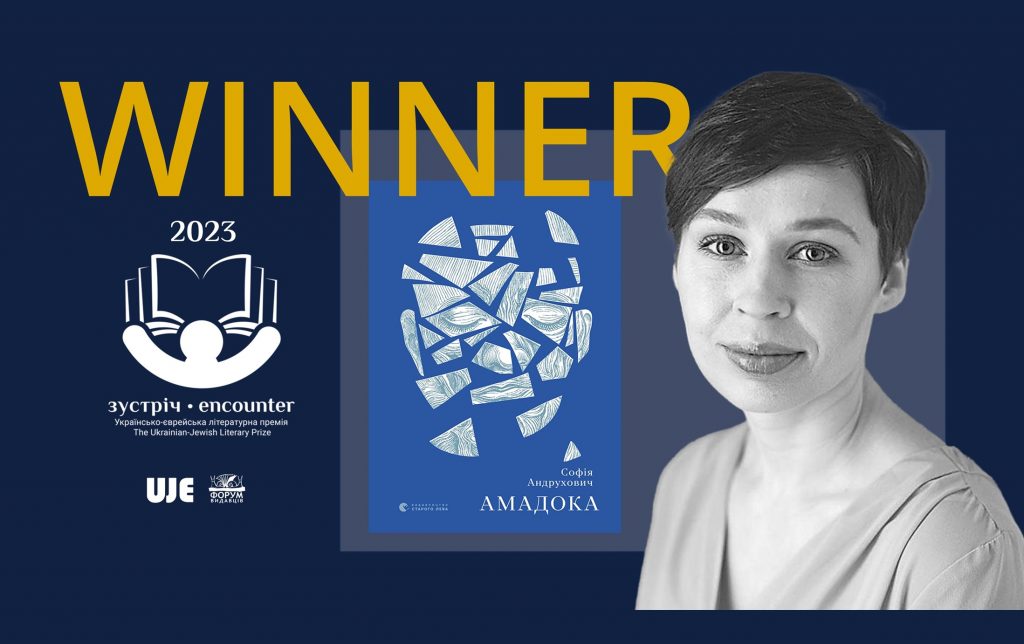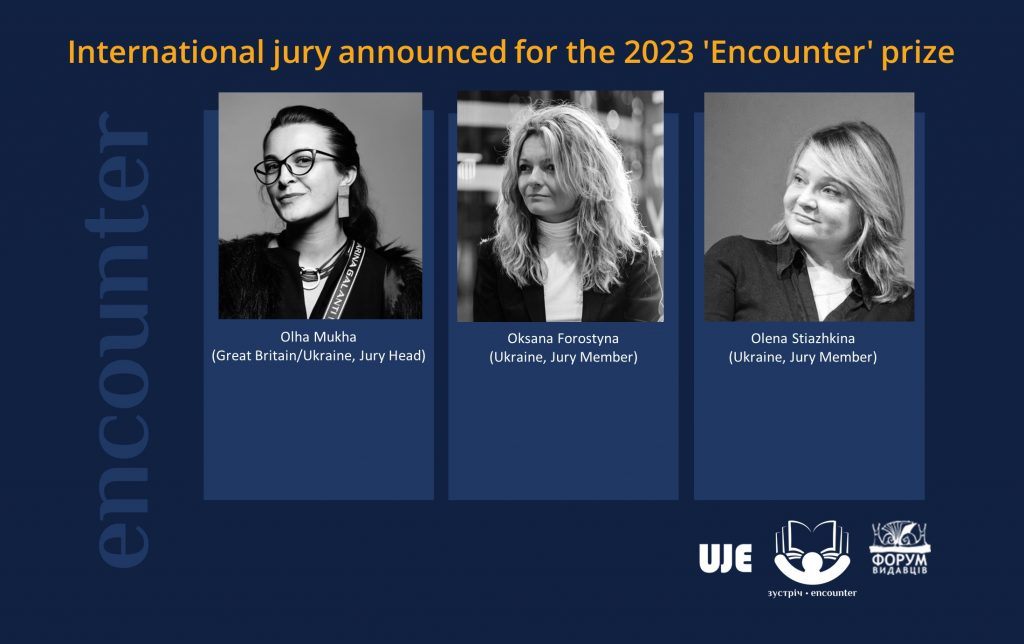The winner of the 2023 'Encounter' prize is the novel Amadoka by Sofia Andrukhovych
Ukrainian Jewish Encounter (UJE), a Canadian charitable non-profit organization, and Ukraine's NGO "Publishers Forum" (Lviv, Ukraine) are pleased to announce that Amadoka, written by Sofia Andrukhovych and published by Ukraine's "The Old Lion Publishing House" in 2020, is the third winner of "Encounter: The Ukrainian-Jewish Literary Prize" ™.
The award ceremony for the 'Encounter' prize will be live-streamed on 5 October at 8:30 pm EST (6:30 pm UK time) from the 2023 Lviv BookForum. To watch, register for Event #6 here.
Sweeping in time and scope, the book's title, Amadoka, is derived from the name of the largest lake in Europe, situated on the territory of contemporary Ukraine. The novel is not about the lake but about its disappearance, the disappearance of entire worlds and cultures, and about what remains in its place. Is there a link between World War II and the Holocaust and the destruction of the Ukrainian intelligentsia during the Stalinist repressions? What of the war Russia has raged against Ukraine, a war that began not in the 21st century, but long ago? And what of memory, collective and individual?
Andrukhovych is a writer, translator, and publicist. She has authored seven books of prose, including Milena's Summer (2002), Old People (2003), Wives of their Husbands (2005), Salmon (2007), Felix Austria (2014), Hen Constellation (2017) and Amadoka (2020), and has translated several works by Manuela Gretkowska, Clive Staples Lewis, J.K. Rowling, Kazuo Ishiguro, Ayn Rand and Tony Judt. Her novel Felix Austria was awarded the BBC Ukrainian Book of the Year Award in 2014 and, in 2017, was awarded the Visegrad Eastern Partnership Literary Award (VEaPLA). In 2015, she received the Joseph Conrad Korzeniowski Literary Award. In 2023, the novel Amadoka was awarded the Sholem Aleichem Prize. Her works have been translated into English, Polish, German, Czech, French, Hungarian, Serbian, and other languages.
"Ukrainian publishers and writers have faced many challenges because of Russia's criminal war against Ukraine," said Natalia A. Feduschak, UJE's Director of Communications. "Yet they have persevered. Through their dedicated efforts, Ukrainian cultural and literary figures have continued their work. They have appeared at international book fairs and festivals, bringing the Ukrainian voice to a worldwide audience. This voice pays tribute to Ukraine as a dynamic multiethnic state, making it possible to understand the diversity of its communities, including a better understanding of the relationship between Ukrainians and Jews."
Members of the international jury commented on the winning entry and books submitted for the 2023 'Encounter' prize:
Olha Mukha (Great Britain/Ukraine, Jury Head)
Despite the considerable resonance in society after its launching, Sofia Andrukhovych's novel Amadoka has not yet been sufficiently discussed or even read enough. 'A guaranteed discussion or a hypothetical catharsis?' — this is what the jury members and I asked ourselves when we were evaluating the shortlisted works. And we chose a guaranteed discussion. But in this case, is it possible beyond catharsis?
"Who am I, father? Do you know who I am?" the (un)real Bohdan continues to ask.
"No, I'm not afraid. I know who I am. What do I have to be afraid of now?" he says confidently before the show where he is being exposed.
The ending of the novel is a very powerful metaphor for the questioning of family ties, broken prohibitions such as stolen letters, documents, and artifacts, betrayals, deaths, unrequited loves, and the stunning twists and turns of memory. The long history of relations between Ukrainians and Jews is often a story of forbidden loves and the impossibility of relationships. The fury of limitations, the price of omissions, the happiness of the very possibility of intimacy and the joint search for what was once there for sure — an ancient lake, which worth lies in a journey of looking for it. But can love disrupt the order of the world? Can an encounter destroy the order of existence?
"There are things that seem to have nothing evil in them, but they are simply impossible. They cannot be allowed. There are paths that cannot be crossed. There are worlds that can only exist separately from each other." — reflects the heroine of the historical part of the 'Amadoka' saga. Ulyana, finally realizing that "it was she and Pinchas who caused war, suffering and death, disrupting the order of the world with their love."
The order of the world and the status of authenticity are questions that the characters ask themselves in all the storylines of the novel, or at least three novels under the same cover at a time. In search of an understanding of what is happening, we follow the stories of the neoclassics — Viktor Petrov and his relationship with Sofia Zerova, the lover Panteleimon Kulish and his "silent deity" Marko Vovchok, and the correspondence between Mykola Zerov and Mykola Khvylovyi, Stalin's repressions, persecution and destruction of the Ukrainian intelligentsia in the 1930s, all of which are reflected in the characters and stories of contemporary heroes, Sofia Andrukhovych leads us not to comprehend, but to feel. The Man's painful identity reproduction, or rather the construction of himself through non-his memories and an imposed identity, sometimes resembles our reproduction of identity, the blurring of our boundaries.
The novel is a query for authenticity that is about to be spilled out, an encounter with oneself, authenticity, awakening on a common path — all of this resonates strongly with the mission of the 'Encounter' prize. It was a difficult choice. But it is a natural choice.
Oksana Forostyna (Ukraine, Jury member)
One may say we are blessed to have more excellent Ukrainian books than book awards to highlight them. The downside of the abundance is that many lack the attention they deserve, and that means we need a more focused and nuanced look. And that's not only the authors and publishers who need validation, that's us who need the discussion about their book, and we need these discussions not for them, but for ourselves. I believe that's what the 'Encounter' literary prize stands for.
There is a paradox in how Sofia Andrukhovych's Amadoka made its way to Ukrainian minds. On the one hand, it was much appreciated, discussed, prized, and even widely read as a "pandemic book", i.e., it appeared when most of us slowed down and had a chance to read the big volume. On the other hand, the book is too multilayered, too audacious to articulate the uncomfortable questions, too far-reaching. The book is too much to be a one-season novel, even if a season is extended. It's fair to say Amadoka already received a lot of attention; however, it certainly deserves much more.
Olena Stiazhkina (Ukraine, Jury Member)
Now, we know very well how to be strong and how to turn our fury into the death of our enemies. And, in spite of our anger, we still have the capacity for love and togetherness.
'Encounter' is an award whose participation in the jury gave me the opportunity to live a part of my life not only to the sound of air raids, but also with people who survived hard times. Jews and Ukrainians often had a hard time. We had catastrophes of such magnitude that other peoples could be wiped out. But we survived together. The winning book, like the other books on the shortlist, is about our common answers to the most important questions — the nature of goodness.
Every day, we have a lesson about the nature of evil. Russians are masters of such lessons. Lessons of goodness we got from our elders — Jews and Ukrainians. And probably the simple question of Amadoka — "Why? Why did he save them?" — has an answer in today's life: because we are human, we are Ukrainians and Jews who lived together and will live together.
Our stories are incomplete without each other
Founded in 2019, "Encounter: The Ukrainian-Jewish Literary Prize" ™ is awarded annually to the most influential work in literature and non-fiction (in alternate years) that fosters Ukrainian-Jewish understanding, helping solidify Ukraine's place as a multiethnic society and giving truth to the motto, "Our stories are incomplete without each other."
The prize is valued at 7000 Euros. The winner receives 6000 Euros, with the author/s receiving 4000 Euros and the publisher 2000 Euros. Four (4) incentive awards will receive 250 Euros each.
The first 'Encounter' prize was awarded in September 2020 in the fiction category to Vasyl Makhno for his novel Eternal Calendar (Lviv: The Old Lion Publishing House, 2019). The second year of the award in 2021 was dedicated to the non-fiction category, with the winner being Yohanan Petrovsky-Shtern for the Ukrainian-language translation of his groundbreaking work, The Anti-Imperial Choice: The Making of the Ukrainian Jew (Kyiv: Krytyka, 2018).
The 2022 'Encounter' prize was not awarded in connection with Russia's genocidal war against Ukraine.
Despite the many challenges faced by Ukraine's literary community, 12 Ukrainian publishers submitted 20 books in the 2023 competition. The long list featured ten books, five of which ended up on the shortlist.
Along with Amadoka, the following books were shortlisted:
Oleksiy Nikitin, Bat-Ami (Kyiv: Phoenix Publishing House, 2021)
Oleksiy Nikitin, Bat-Ami (Kyiv: Vydavnytsvo Phoenix, 2021)
Anna Frajlich, Father's Name (Ternopil: Krok Publishing House, 2021)
Anna Frajlich, Im’ya bat’ka (Ternopil: Vydavnytsvo Krok, 2021)
Ivanna Stef’iuk, About You (Brustury: Discursus, 2022)
Ivanna Stef’iuk, Pro vas (Brustury: Discursus, 2022)
Ida Fink, The Garden Floats Away (Lviv: The Old Lion Publishing House, 2021)
Ida Fink, Sad vidplyvaye (Lviv: Vydavnytsvo Staroho Leva, 2020)
The international jury for the 2023 'Encounter' prize is comprised of:
Olha Mukha (Great Britain/Ukraine, Jury Head)
Olha Mukha is an author, philosopher, cultural analyst and manager, and expert on international communications and human rights. Based in London, she holds a Ph.D. in philosophy from the Ivan Franko National University of Lviv.
Oksana Forostyna (Ukraine, Jury Member)
Oksana Forostyna is a publisher, editor, author, and translator. She is Europe's Futures Fellow at the Institute for Human Sciences in Vienna (IWM), Opinion Editor at Ukraina Moderna, a Visegrad Insight Fellow, and a contributor to Liberties, The European Review of Books, Krytyka, and Visegrad Insight.
Olena Stiazhkina (Ukraine, Jury Member)
Stiazhkina is a Ukrainian writer, Doctor of Science, Professor of History, Leading Research Fellow at the National Academy of Science's Institute of History of Ukraine, and a member of PEN Ukraine.
Read more about the jury members here.





















